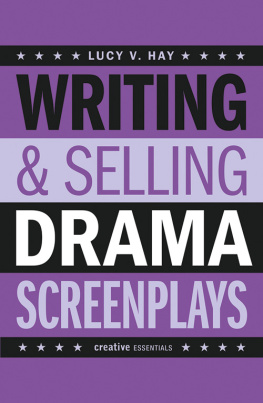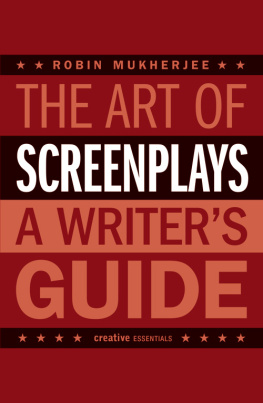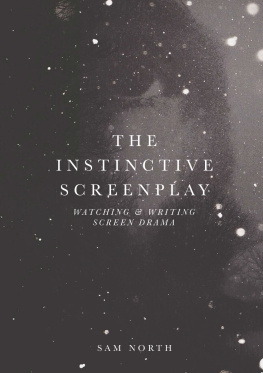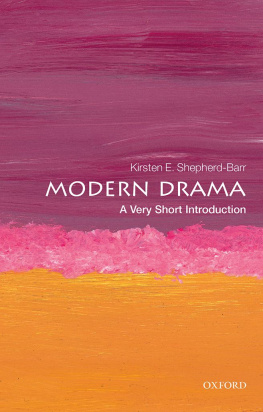It may be drama features that win the most awards and kudos from critics, but in the current marketplace youre unlikely to sell a drama screenplay in the way you would a genre script.
Breaking down the nuts and bolts of what differentiates drama from genre, Writing and Selling Drama Screenplays will consider questions such as:
What is emotional truth?
What separates stereotypical and authentic characters?
What are the different types of drama feature screenplay?
How do we make these films, when theres no money?
What are the distribution opportunities for dramas?
Exploring the ways in which drama and authenticity work, it will empower screenwriters to make their own story and character choices, so they can write and also help to package, finance and even make their own drama features.
Writing and Selling Drama Screenplays includes detailed case studies of produced dramas made on both shoestring and bigger budgets, and industry insights from their writers, directors and producers. It looks in-depth at Scottish BAFTA-winning Night People, the iconic coming out movie Beautiful Thing, the touching New Orleans drama Hours, starring the late Paul Walker, and the ambitious true story of Saving Mr Banks, based on the battle of wills between Mary Poppins author PL Travers and Walt Disney himself. It will also discuss films such as Brokeback Mountain, American Beauty, The King's Speech, Juno, Erin Brockovich, Changeling and Girl, Interrupted.

Lucy V. Hay is a novelist, script editor and script reader. She is one of the founding organisers of the London Screenwriters Festival and Associate Producer of the dark Brit Thriller Deviation (2012), starring King of the Indies Danny Dyer and Hellboy 2s Anna Walton. Lucy has read for a variety of production companies, funding initiatives and screen agencies as well as individual directors and producers with her Bang2write script consultancy. She owns the scriptwriting craft tips and networking site at www.bang2write.com and the online writers group on Facebook and Twitter, Bang2writers. She lives in Devon.

For all the writers and filmmakers who were so generous with their time and insights in making this book possible, plus the Bang2writers who keep me on my toes!
CONTENTS
PREFACE
Bang2write and its accompanying social network is often cited online by others as being for those interested in genre writing, and certainly my articles on the differences between horror and thriller remain some of the most oft-hit on the site. But Ive always had an affinity for drama. Though Ive always enjoyed thrillers and horror, plus blockbusters and their ilk (and no doubt always will), it was actually drama that lit a fire under me in terms of storytelling. I did a media course as a teenager and one of our first assignments was to do a review of a non-Hollywood film (no doubt our lecturers attempt to challenge media imperialism for me, it worked!). Back then there was no Netflix, Amazon Prime or YouTube; there was barely DVD. So I went to the local video store and my mate Dylan recommended Once Were Warriors (1994), a New Zealand drama about a family descended from Maoris whose story involved domestic violence, sexual abuse and bereavement after a suicide. Ill be honest and say that, back then, as a young white girl in rural Devon, I was completely unaware of Maori people (never mind the fact that theyre often treated as outcasts despite being indigenous to New Zealand), so it was a huge eye-opener for me. Though I didnt know the word disenfranchisement then, I was struck by the themes of injustice and loss in the film, and it was like a million light bulbs went on in my head. For the first time, I realised movies could be challenging, as well as entertaining.
Fast-forward a few years and I was on my first work placement, as a script reader for a literary agent. The UK is known for hard-hitting, realistic, gritty drama and it reached a particular high point in the 1990s, so its not really surprising that, in the early noughties, there was a plethora of very worthy, low-budget drama screenplays in the spec pile (most of them feature-length, inspired by the likes of Loach, Leigh and Russell). Though this appears to have dropped off in recent years (especially in favour of science fiction and fantasy TV pilot screenplays for returning series, interestingly), I still read a lot of spec drama screenplays. Id wager at least 30 per cent of Bang2writes general submissions pile is drama, whether short film, feature, TV pilot or web series, as it seems spec screenwriters and filmmakers love to try to put real life under the microscope. And why not? We all want to make sense of the world around us.
Writers also frequently target low-budget drama as a handy foot in the door to the industry. However, whilst theyre right that it gives their screenplays a greater likelihood of being produced (especially short-film drama screenplays), there appears to be a fundamental misunderstanding amongst many about just what a well-conceived drama screenplay entails. This may be due not only to the story or characters they choose, but also to arena, storytelling devices (like flashback), and dialogue. In the course of this book, then, I will break down what drama means to me as an avid consumer of such produced content and reader of (often misfiring!) drama screenplays. I will also look at the common mistakes of spec dramas, especially with reference to character, storytelling and structure. In addition, I will look at a number of produced dramas of varying types, including (but not limited to) short films, adaptations and star-led vehicles. I will also look at the concept of theme and message, as well as target audience and budget. Last of all, since I focused on filmmaking resources in my previous screenwriting book (and many will obviously cross over), I have created a very different resource for the back of this book. I hope you like it.
Though produced dramas may win the most awards and kudos from critics, youre unlikely to sell a drama feature screenplay as easily as you might a genre script, at least in the current marketplace. Breaking down the nuts and bolts of what differentiates drama from genre film, Writing and Selling Drama Screenplays will guide you to an understanding of how the best drama feature screenplays are NOT about abject misery or using stereotypical depictions of socio-ethnic groups to get their messages across. It will also open the lid on the struggles of screenwriters and producers in getting their own projects off the ground. As usual, there will be spoilers in abundance, including detailed case studies of produced dramas (and one currently unproduced), which will give you the truth and nothing but the truth on just how much of a labour of love it is to get your drama screenplay made and out there, in front of an audience. Think youre wo/man enough to do it?
Lucy V, September 2014
WHAT DRAMA IS NOT
(AND BEYOND)
DRAMA VERSUS GENRE
Many writers confess to being unsure what drama really is. If you look online, you will often see the label used interchangeably with genre. On IMDb, most films appear to be tagged drama and many writers will argue that drama is a genre in its own right. But forget how you personally feel about drama and what it is. Whats key here is how the industry perceives genre and drama:
Next page






